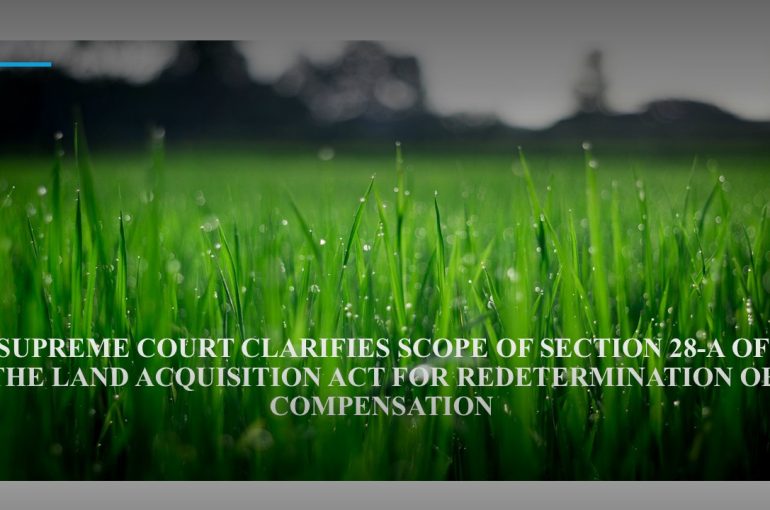SUPREME COURT CLARIFIES SCOPE OF SECTION 28-A OF THE LAND ACQUISITION ACT FOR REDETERMINATION OF COMPENSATION
The Judgment in the Case of Banwari and Others Versus Haryana State Industrial and Infrastructure Development Corporation Limited (Hsiidc) And Another(CIVIL APPEAL NO. 13348 OF 2024 (Arising out of SLP(C) No.12221 of 2022)was delivered by a Division Bench of the Supreme Court of India, comprising Hon’ble Justice B.R. Gavai and Justice Ahsanuddin Amanullah, On 17 December 2024.
BRIEF FACTS
The dispute arose regarding the land acquired by the Government under the Land Acquisition Act, 1894, for the construction of the Kundli-Manesar-Palwal Expressway. The Appellants land, measuring 8 Kanal 17 Marla in village Majri, Tehsil Bahadurgarh, was acquired through a notification issued under Section 4 of the Land Acquisition Act, 1894 (hereinafter referred to as “1894 Act”) on 17th November 2004. The compensation awarded for the land was Rs. 12, 50,000/- per acre. Aggrieved by the Award, similarly, situated landowners filed for a reference under Section 18 of the 1894 Act, resulting in an enhanced compensation of Rs. 19, 91,300/- per acre, as determined by the High Court of Punjab and Haryana on 2nd May 2016. Subsequently, the Appellants (Banwari and Others) filed an application under Section 28-A for redetermination of compensation, which was allowed by the District Revenue Officer on 15th September 2020. The Respondent, Haryana State Industrial and Infrastructure Development Corporation (HSIIDC), filed a Writ Petition before the High Court, challenging this Order. The High Court set aside the Order of the District Revenue Officer, which led the Appellants to appeal before the Supreme Court.
HIGH COURT
The High Court had set aside the Order of the District Revenue Officer, which allowed the Appellants application under Section 28-A for redetermination of compensation. The High Court relied on the judgment in Ramsingbhai Jerambhai and held that Section 28-A was applicable only to the reference court’s award and not to an appellate court’s judgment.
ISSUES
- Whether an application under Section 28-A of the Land Acquisition Act can be filed based on the judgment of the High Court, or whether it is restricted to the reference court’s award under Section 18 of the Act?
- Whether the High Court erred in relying on the judgment in Ramsingbhai Jerambhai without considering the judgment in Pradeep Kumari?
CONTENTIONS BY BOTH PARTIES
APPELLANT CONTENTIONS
The Appellants argued that the High Court’s reliance on the judgment in Ramsingbhai Jerambhai was erroneous as it failed to consider the earlier judgment in Pradeep Kumari, which interpreted Section 28-A more broadly and extended its benefits beyond the reference court’s award. They contended that an application under Section 28-A should be allowed based on the High Court’s decision in RFA No. 429 of 2013.
RESPONDENT CONTENTIONS
The Respondents argued that the High Court was correct in following the judgment in Ramsingbhai Jerambhai, which restricted the application of Section 28-A to the reference court’s award. They maintained that the Appellants were not entitled to redetermination of compensation based on the High Court’s decision in the RFA, as it was made by an appellate court and not the reference court.
SUPREME COURT
The Supreme Court examined the issue and noted that the judgment in Ramsingbhai Jerambhai had clarified that Section 28-A applications could only be filed within three months of the reference court’s award, not from the judgment of an appellate court. However, the Court also referred to Pradeep Kumari, where it had previously ruled that Section 28-A could extend to subsequent awards made by the court. The Court emphasized that Section 28-A is a beneficent provision aimed at ensuring equitable compensation for similarly situated landowners, and a restrictive interpretation would defeat its purpose. The Court ruled in favor of the Appellants, allowing the redetermination of compensation based on the enhanced compensation awarded by the High Court in RFA No. 429 of 2013. The Court held that the right to redetermination arises from the award on which redetermination is sought, and the interpretation should be in line with the legislative policy.
CONCLUSION
The Supreme Court allowed the appeal, quashed the High Court’s judgment of 25th November 2021, and upheld the Order of the District Revenue Officer from 15th September 2020. The Court emphasized that the right to redetermination of compensation under Section 28-A is not limited to the first award but extends to subsequent awards made by the court. The judgment in Pradeep Kumari was reaffirmed as authoritative, and the Court adopted an interpretation that advanced the legislative policy of providing relief to the inarticulate and poor.
Baddam Parichaya Reddy
The Indian Lawyer and Allied Services
Associate





































Leave a Reply